Despite the challenges posed by the COVID-19 pandemic, Ukraine’s dynamic IT sector has emerged as a resilient and thriving industry, demonstrating remarkable progress amidst a backdrop of otherwise gloomy economic conditions. Due to the epidemic, there has been an extraordinary transition from the physical to the digital world, with the majority of commerce moving online and whole workforces working remotely. Rapid digital transitions that businesses have to go through around the world are driving up demand for IT services.
Because of the significant development it has undergone recently, Ukraine’s tech industry was ideally positioned to take advantage of this opportunity. Since the first IT businesses started popping up in the middle of the 1990s, the industry has grown rapidly.
With a strong foundation built over the years, Ukraine’s tech hubs in Kyiv, Lviv, Kharkiv, and Dnipro have thrived amidst the economic downturn. Despite a 4.4% contraction in GDP and a 4.6% decline in exports, the rapidly growing IT industry experienced an impressive 20.4% export growth in 2020, surpassing $5 billion for the first time, as reported by the National Bank of Ukraine.
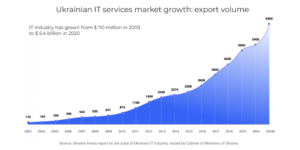
While outsourcing played a significant role in the industry’s growth, Ukraine’s IT sector had evolved beyond cost competitiveness. The industry had matured, offering value beyond affordable programming talent, attracting international customers with its expertise and quality. With a year-over-year growth rates of 20-30%, the industry had witnessed a remarkable increase to 40-50% growth. At that time, it contributed 4% to Ukraine’s GDP and employed approximately 200,000 professionals who enjoy some of the highest salaries in the country.
Adaptation of IT sector in Ukraine
The Ukrainian tech industry has exhibited resilience and adaptability in the face of challenging military circumstances. Prior to the onset of the conflict, the national IT sector had established itself as a prominent exporter of IT services in Europe, experiencing annual growth rates of 25-30% and contributing over 4% to Ukraine’s GDP. This thriving industry was characterized by a robust talent pool resulting from formal education programs and career transitions, leading to a high number of IT graduates.
However, the outbreak of the conflict marked a new chapter for the industry. Despite initial disruptions, the sector demonstrated remarkable tenacity. By the end of the first ten months of 2022, the IT industry had generated $6 billion in export revenue, reflecting a 10% growth compared to the previous year. Many tech companies successfully ensured business continuity, maintaining productivity levels between 85-90% during the early stages of the conflict and achieving positive growth dynamics from April onwards.
Nevertheless, the industry as a whole faced significant challenges. Approximately 34.3% of companies effectively adapted to the new circumstances, while the majority (61.3%) encountered ongoing obstacles but managed to maintain overall stability.
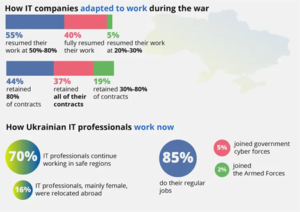
Key challenges for IT companies during this period included employee migration and relocation, restrictions on international travel for IT professionals, military recruitment of IT talent, client retention and risk mitigation, as well as currency regulations and restrictions imposed by the National Bank of Ukraine.
The positive indicators observed in the industry were made possible by extensive and rapid transformations undertaken throughout the conflict. Companies successfully implemented comprehensive business continuity plans, adopted flexible work models, relocated teams, and diversified their office locations both within Ukraine and abroad. Despite the challenging circumstances, companies continue to operate seamlessly, deliver projects even during periods of blackout, fulfill tax obligations punctually, attract new clients, and actively expand their presence in the global market.
Market’s volume
The IT industry in Ukraine has demonstrated remarkable resilience and growth during wartime, standing out as the only export sector that has expanded its export volumes compared to the previous year. In contrast, other industries such as metallurgy, mineral products, and the chemical industry have suffered significant losses, with declines ranging from 42.6% to 59%. The share of IT services exports in GDP has increased by 51%, reaching 5.4%, while the IT industry represents nearly half (47.0%) of total service exports.
Numerous IT companies have successfully retained their contracts and secured new clients, attracting global investors who seek the expertise of Ukraine’s IT professionals. According to AmCham, 96% of companies plan to continue their operations in Ukraine throughout 2023. Despite the ongoing war, a significant percentage of IT sector professionals, ranging from 85% to 95%, have resumed their work duties. Notably, only 1% of IT companies in Ukraine face challenges in meeting their employees’ salaries.
As of November 1, the IT industry has contributed UAH 26.6 billion in taxes and fees, highlighting its substantial economic impact. IT companies continue to operate seamlessly, executing projects even during blackouts, fulfilling tax obligations punctually, attracting new clients, and actively expanding their presence in the global market. Research indicates that 43.1% of IT companies anticipate business growth for the year, and an overwhelming 93.4% plan to continue investing in Ukraine.
Prior to the war, Ukraine boasted approximately 5,000 IT companies housing over 300,000 highly skilled tech workers. Despite the adversities faced, a mere 2% of these companies ceased operations, showcasing the resilience and thriving nature of the remaining ecosystem. A key factor in the industry’s ongoing growth amid wartime conditions is the collaboration between businesses and the government, fostering joint mechanisms and initiatives that maximize the industry’s potential.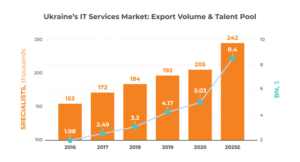
Despite the challenges of the conflict, the IT market in Ukraine remains robust. Currently, the industry boasts nearly 309,000 IT professionals. Korn Ferry’s 2022 IT industry compensation study highlights several notable trends:
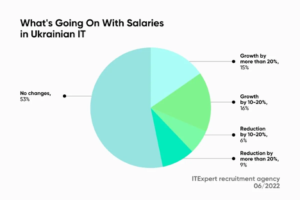
The above-mentioned data serve as evidence that the Ukrainian IT market has not only withstood the challenges of the past six months but has also thrived against all expectations. This remarkable achievement can be attributed to several critical factors that have fortified the IT industry:
The Ukrainian IT sector’s ability to adapt and flourish amidst challenging circumstances positions it as a resilient and promising market for global investors and businesses seeking exceptional IT services.
Growth factors
Ukraine’s IT industry has experienced significant growth and success over the past decade, fueled by favorable business conditions, a highly educated workforce, and a strong demand for IT services across various industries. The government has played a crucial role in creating an enabling environment for the IT sector to thrive, implementing key initiatives and reforms that have opened new opportunities for its growth.
One of the notable government actions has been a massive deregulation effort, with over 450 outdated regulations canceled. This move has eliminated unnecessary bureaucratic hurdles and streamlined business processes for IT companies. Additionally, the implementation of a new Privatization Law and a more transparent VAT refund system has further enhanced the business climate and encouraged investment in the IT sector. The establishment of the High Anti-Corruption Court of Ukraine has demonstrated the government’s commitment to combating corruption and ensuring a fair and transparent business environment.

President Volodymyr Zelenskyy has been a vocal supporter of Ukraine’s IT industry and has introduced initiatives to strengthen the country’s tech ecosystem. Diia City, a digital city infrastructure designed specifically for IT companies, is a prime example of the government’s support. President Zelenskyy aims to transform Ukraine into the largest IT hotspot in Europe through Diia City, offering attractive incentives such as low taxes and simplified regulations.
The collaborative efforts of The Ministry of Digital Transformation, the Binance Blockchain Ecosystem, and the Lviv IT Cluster demonstrate a commitment to nurturing Ukraine’s IT landscape and promoting inclusive access to technology education. The IT Generation project aligns with the country’s vision of fostering innovation, enhancing digital skills, and creating a thriving tech-driven economy.
This project aims to offer valuable and accessible IT learning and training opportunities to Ukrainians aged 21 to 60, equipping them with digital skills and enhancing their employability. According to a press release by the United Nations Development Programme in 2022, the IT Generation project offers classes that span from 2 to 6 months. This means that within a relatively short timeframe of less than half a year, thousands of Ukrainians have the potential to join the thriving tech sector in the country. Initial estimates indicate that around 60,000 Ukrainians could greatly benefit from the IT Generation program.
These government-led actions, along with the general factors supporting the growth of Ukraine’s IT sector, have contributed to its resilience. One key aspect is the establishment of global trust in Ukrainian IT services. International clients and investors have recognized the high quality and reliability of Ukraine’s tech industry, leading to increased partnerships and collaborations. The number of multinational corporations establishing their research and development (R&D) operations in a country is a strong indicator of a thriving IT industry, even in the face of a challenging business climate. Ukraine stands out in this regard, with an impressive and growing presence of global companies in the country.

In addition to the more than 4,000 tech companies operating in Ukraine, an impressive 18 of them are listed among the top 100 outsourcing businesses. Ukraine collaborates with 100 clients from the Fortune 500 list, and this number is expected to continue growing. These statistics demonstrate the global trust and confidence in Ukraine’s IT sector. With this foundation of trust established, it is worth exploring the next factor that contributes to the resilience of Ukraine’s IT industry: the expertise and proficiency of its professionals.
The broad range of industries that Ukraine’s IT sector focuses on is one of the elements related to the robust foundation. The fact that Ukraine’s IT industry exports more services than any other in the world explains why its IT services have such a wide clientele. It contributed around 8.3% of the nation’s $60,4 billion in exports. As a result, the more industries use Ukraine’s IT services, the greater demand, and higher resilience.
Key areas of the Ukrainian IT market include software development, software maintenance, quality assurance (QA) testing, and research and development. As the top outsourcing destination, Ukrainian IT professionals have proven their expertise in utilizing technologies such as JavaScript (JS), Python, TypeScript, and Kotlin. They offer a wide range of services that cover all stages of software development, including ongoing support and testing.
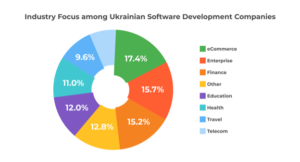
The resilience of Ukraine’s IT industry is further supported by its commitment to innovation, which aligns with the national agenda. The country embraces projects aimed at promoting global outreach and nurturing the growth of the IT sector. Two notable initiatives in this regard are Diia City and IT Generation.
These forward-looking projects demonstrate Ukraine’s commitment to attracting investment and reducing barriers for the tech sector to thrive. This approach has enabled Ukraine’s IT industry to withstand the challenges it faced on February 24, 2022, and continue on its path of resilience and growth.
Ongoing challenges
On October 10, 2022, Ukraine faced a severe challenge when Russia initiated massive missile strikes on energy infrastructure, resulting in a widespread power outage across the country. This situation posed significant risks for the IT industry, particularly in terms of disrupted internet and cellular connectivity.
To mitigate these risks, Ukrainian IT businesses have taken proactive measures to ensure preparedness for various scenarios. Companies have implemented robust business continuity plans (BCPs) that include:
Despite the geopolitical complexities and physical infrastructure challenges faced by Ukraine, the tech sector remains resilient and optimistic. The adoption of Starlink terminals and power generators has enabled tech specialists to continue delivering their services during outages.
A significant advantage of Ukraine’s IT companies lies in their reliance on cloud-based architectures and AI-powered technologies. This allows them to operate at a high level even with limited resources and entirely digital infrastructures. Remote work has proven successful in Ukraine due to the country’s strong tech talent pool, existing client base, mobile digital infrastructure, favorable regulatory environment, government support, and global reputation.

The resilience of Ukraine’s IT sector can be attributed to its people, including both employees and managers. During the initial months of the war, approximately 80% of IT companies effectively mitigated the effects of the conflict and provided their employees with safe working environments. In March 2020, IT exports remained strong, with 96% of the previous year’s indicators preserved. Only a minority of IT companies (10%) experienced contract losses. Looking ahead, 77% of Ukrainian IT companies are actively seeking to expand their client base, demonstrating their confidence in future growth opportunities.
Overall, Ukraine’s IT sector has demonstrated remarkable resilience in the face of adversity, leveraging technological advancements, strategic planning, and the dedication of its workforce. These factors position the industry for continued success amidst challenging circumstances.
___________________________________________
This report was made by Ukrainian Marshall on June 29, 2023
Ukrainian Marshal is a team of experienced managers from Ukraine and the West that helps with the reconstruction of the country. Many head of states are visiting Ukraine with a lot of promises, funds from international organizations are presented, but most projects need private initiates to get alive. Our team is visiting many cities, understanding local needs and analyzing investment projects in production, logistics, agriculture, real estate, green energy, food, retail and many more industries.
We help to find international investors and to give those investors the right management support. Ukraine is moving towards European Union, many legals changes are on its way and corruption is considerably getting less. Despite the horrible war in parts of the country, now we see the right moment for international investors to come to Ukraine. It is important to create new jobs in Ukraine – for this reason we help Ukrainian producers to find new customers and international companies to settle down in Ukraine with very favorable economic opportunities. Soon, we will start our own Ukrainian Investment Fund where smaller investors will have the chance too to participate in the coming boom of the country.